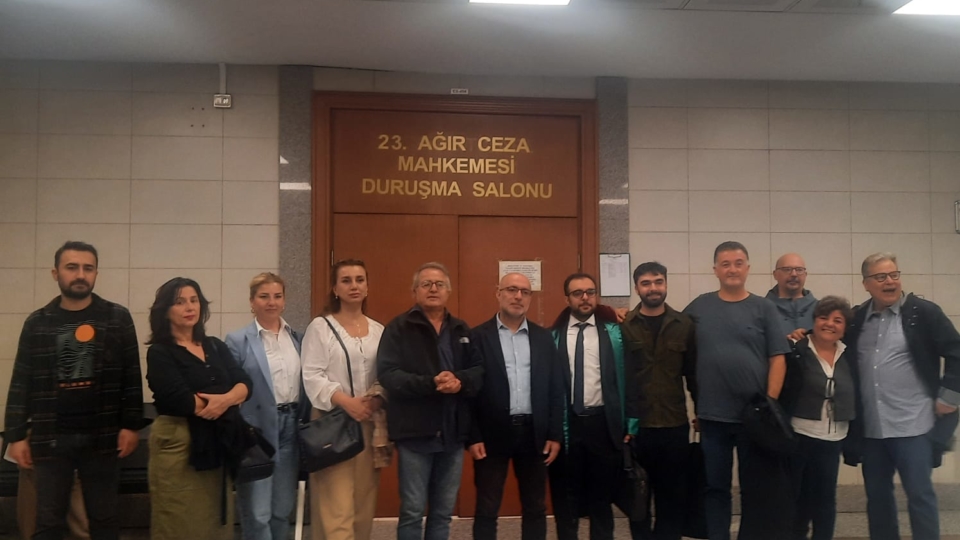Author Yavuz Ekinci appears before the court for the fourth time over the “conversations” of his fictional characters
Note: The Turkish version of this report is available below
In the case where author Yavuz Ekinci is being tried on the charge of “making propaganda for an armed terrorist organization” because of his 2014 novel Rüyası Bölünenler (Dream Divided), published by Doğan Kitap, the fourth hearing was held on October 6, 2025.
The hearing, held at the Istanbul 23rd High Criminal Court, was brief; due to the outstanding deficiencies in the file, the court postponed the trial to November 10, 2025.
The hearing was attended by PEN Norway, Halil İbrahim Özcan (Second President of PEN Turkey), the Media and Law Studies Association (MLSA), other authors and Ekinci’s readers.
Indictment: The novel’s characters “make terrorist propaganda”
According to the indictment, statements found on a total of six pages in Ekinci’s novel are alleged to be of a nature that “legitimize, praise, or encourage the use of force, violence, or threat by an armed terrorist organization.”
The investigation began with a CİMER complaint
The process against Ekinci began on February 8, 2023, with a complaint submitted to the Presidency’s Communication Center (CİMER) regarding Rüyası Bölünenler. Yet, the novel had already been published and distributed in 2014.
At the hearing dated December 9, 2024, the Istanbul 23rd High Criminal Court ruled to dismiss the case on the grounds of duplication, since Ekinci had already been tried once before for the same charge (terrorist propaganda). However, upon the prosecutor’s appeal, the Istanbul Regional Court of Appeal overturned the decision, citing incomplete examination, and sent the file back to the İstanbul 23rd High Criminal Court.
At the hearing dated July 9, 2025, the court complied with the regional court’s reversal decision and ruled that it should be investigated whether a copy of the novel had been submitted to the prosecutor’s office before publication, and if so, on what date.
At the fourth hearing on October 6, 2025, it was observed that both the presiding judge and the trial prosecutor had changed. Yavuz Ekinci and his lawyer Can Ekinci stated that they repeated their previous defense. The court noted that the letter requested from Doğan Kitap regarding the matter had still not been received and postponed the trial to November 10, 2025 for the deficiency to be remedied.
The right to a fair trial within a reasonable time has been violated, Attorney Can Ekinci
Attorney Can Ekinci: “The right to a fair trial within a reasonable time has been violated”
Yavuz Ekinci had previously been acquitted on the grounds of duplication, as he had been tried before for the same charge. However, during the trial, the file of the Istanbul 34th High Criminal Court, which the court cited as the basis for duplication, had not been summoned.
Speaking after the hearing, attorney Can Ekinci recalled that the appellate court had pointed out two main deficiencies.
The first of these was resolved when the Istanbul 23rd High Criminal Court requested and added to the file the case file from the İstanbul 34th High Criminal Court, which had previously tried Ekinci on the charge of terrorist propaganda.
However, the second deficiency was that the court had still not received the official answer regarding whether a copy of the novel had been submitted to the prosecutor’s office by Doğan Kitap before publication.
According to attorney Ekinci, if this letter reaches the court by the hearing on November 10 and the prosecutor submits his opinion, a verdict can be expected at that session.
Ekinci emphasized that the prolonged trial violated the right to a fair trial within a reasonable time and said:
“Even after the file was returned from the appellate court, it was kept waiting for a year. The fact that there is still no response to a simple question regarding the submission date of a published book to the prosecutor’s office is contrary to the rule of law. The court should make an assessment within the scope of freedom of the press and expression and acquit Yavuz Ekinci. Unfortunately, I predict that the court will issue a dismissal decision due to the statute of limitations. According to the Press Law, if the book was submitted to the prosecutor’s office before it was published in 2014, the case should have been filed within six months at the latest. If the prosecution claims that the book was not delivered to them, the case still should have been filed within six months from the date they became aware of it. Considering the dates when the CİMER application was reported to the prosecutor’s office by the police and when the prosecutor requested the seizure of the book from the Criminal Court of Peace, it is clear that this period has long expired. Moreover, considering that the book was published in 2014, the general eight-year statute of limitations under criminal law has also expired.”
Author Yavuz Ekinci: “What I imagined as fiction, the court perceives as reality”
Speaking to PEN Norway after the hearing, author Yavuz Ekinci expressed his sadness that a novel he wrote had become the subject of a criminal case, while adding that being tried because of his fictional characters was in a way, “gratifying.”
What I imagined as fiction, the court perceives as reality — this shows the power of literature. A confiscation order has been issued for the novel. But as I have said before, the court cannot imprison the characters of a novel. This book has been translated into several languages. It is sold and read in other countries, yet banned in Turkey. So far there have been four hearings. Honestly, I see this entire trial process as part of my literary activity and each hearing as a kind of literary performance
“What I imagined as fiction, the court perceives as reality — this shows the power of literature. A confiscation order has been issued for the novel. But as I have said before, the court cannot imprison the characters of a novel. This book has been translated into several languages. It is sold and read in other countries, yet banned in Turkey. So far there have been four hearings. Honestly, I see this entire trial process as part of my literary activity and each hearing as a kind of literary performance.”
Ekinci recalled the invitation he made before the first hearing and continued:
“That day, through social media and various channels, we invited people saying, ‘We have a talk.’ I invited readers to the 23rd High Criminal Court at Çağlayan Courthouse for a talk titled ‘Why Did I Write This Novel?’. At the second hearing, I told the court, ‘My defense is my novel,’ and handed over a copy of the banned book. At the next hearing, as another performance, I read a section of the banned novel in court.”
The author concluded his remarks with the following words:
“For an author, every moment and every place is part of writing and staging what one writes.
I hope that an acquittal will be delivered at the fifth hearing, because what is at stake in this case is freedom of expression — the most vital matter for writers. Moreover, the verdict in this case will show how Turkish courts view fiction and creativity.
This case should end with acquittal, because the question ‘Why did you write this novel?’ is not one for a prosecutor to ask. Even if they imprison me, the text has already left me. I no longer have control over the characters of that novel. Those characters have long since set out on their own. As I said in court: ‘If imprisoning me crosses your mind, even if you hold me hostage, the characters of my novel will never return.’”
This case is a clear example of judicial harassment
PEN Norway Director Jørgen Watne Frydnes stated that the Yavuz Ekinci case is “a clear example of judicial harassment”:
“If a novel published and distributed in 2014 is still being tried in the final months of 2025, we can no longer speak of legal certainty. The examination of the mandatory time limit for printed works — a condition
required under the Press Law — is being conducted only at the fourth hearing. This is profoundly concerning. Moreover, the author is being prosecuted for the words of his fictional characters. In a world where such logic prevails, none of the novels we consider classics today could ever have been published. We expect Ekinci to be acquitted again and as soon as possible.”
Halil İbrahim Özcan, Vice President of PEN Turkey, who also attended the hearing, said that the case is an example of the political pressure exerted on writers by the government in Turkey. He added that such pressure and prosecutions create self-censorship among writers and push some of them to move abroad to express themselves freely.
PEN Norway will continue to stand in solidarity with Yavuz Ekinci and other writers, journalists, poets and civil society actors in Turkey whose freedom of expression and fundamental rights continue to be violated through judicial harassment and will keep monitoring Ekinci’s case.
Yazar Yavuz Ekinci, romanındaki karakterlerin “konuşmaları” gerekçe gösterilerek dördüncü kez hâkim karşısına çıktı
Yazar Yavuz Ekinci’nin 2014 yılında Doğan Kitap’tan çıkan Rüyası Bölünenler romanı nedeniyle “silahlı terör örgütü propagandası yapmak” suçlamasıyla yargılandığı davada 6 Ekim 2025’te dördüncü duruşma görüldü.
İstanbul 23. Ağır Ceza Mahkemesi’nde yapılan duruşma kısa sürdü; dosyadaki eksikliklerin giderilmemesi nedeniyle mahkeme, duruşmayı 10 Kasım 2025 tarihine erteledi.
Duruşmayı PEN Norveç, PEN Türkiye İkinci Başkanı Halil İbrahim Özcan, Medya ve Hukuk Çalışmaları Derneği (MLSA), Ekinci’nin yazar dostları ve okurları izledi.
İddianame: Roman karakterleri “örgüt propagandası” yapıyor
Savcılık iddianamesinde, Ekinci’nin romanında toplam altı sayfada yer alan ifadelerin, “silahlı terör örgütünün cebir, şiddet veya tehdit içeren yöntemlerini meşru gösterecek, övecek ya da bu yöntemlere başvurmayı teşvik edecek nitelikte” olduğu ileri sürülüyor.
Soruşturma CİMER başvurusuyla başladı
Ekinci hakkında yürütülen süreç, 8 Şubat 2023’te, Rüyası Bölünenler romanı hakkında Cumhurbaşkanlığı İletişim Merkezi’ne (CİMER) yapılan bir şikâyetle başladı. Halbuki roman 2014 yılında basılmış ve dağıtılmıştı.
9 Aralık 2024 tarihli duruşmada, İstanbul 23. Ağır Ceza Mahkemesi, Ekinci hakkında aynı suçtan (terör propagandası) ikinci kez dava açıldığı gerekçesiyle mükerrerlik kararı vererek davanın reddine karar verdi. Ancak savcılığın istinaf başvurusu üzerine İstanbul Bölge Adliye Mahkemesi kararı dosyada eksik inceleme olduğu gerekçesiyle bozdu ve dosya yeniden İstanbul 23. Ağır Ceza Mahkemesi’ne gönderildi.
Mahkeme, 9 Temmuz 2025 tarihli duruşmada, istinaf mahkemesinin bozma kararına uydu ve romanın basılmadan önce savcılığa teslim edilip edilmediğinin ve edildiyse hangi tarihte yapıldığının araştırılmasına karar verdi.
6 Ekim 2025’teki dördüncü duruşmada, mahkeme başkanı ve duruşma savcısının değiştiği görüldü. Yavuz Ekinci ve avukatı Can Ekinci, önceki savunmalarını yinelediklerini belirttiler. Mahkeme, Doğan Kitap’tan istenen bilgiye ilişkin yazının hâlâ ulaşmadığını belirterek eksikliğin giderilmesi için duruşmayı 10 Kasım 2025 tarihine erteledi.
Av. Can Ekinci: “Makul sürede yargılanma hakkı ihlal edildi”
Yavuz Ekinci, aynı suçtan daha önce yargılandığı için mükerrerlik gerekçesiyle beraat etmişti. Ancak yargılama sırasında, mahkemenin mükerrerliğe dayanak olarak gösterdiği İstanbul 34. Ağır Ceza Mahkemesi’ndeki dosya celp edilmemişti.
Duruşmanın ardından konuştuğumuz avukat Can Ekinci, istinaf mahkemesinin kararında iki temel eksikliğe dikkat çekildiğini hatırlattı. Bu eksikliklerden ilki, İstanbul 23. Ağır Ceza Mahkemesi’nin daha önce görülmüş olan 34. Ağır Ceza Mahkemesi dosyasını isteyip dava dosyasına dahil etmesiyle giderildi. Ancak ikinci eksikliğin, roman basılmadan önce Doğan Kitap tarafından savcılığa bir kopya teslim edilip edilmediğine ilişkin yazının hâlâ mahkemeye ulaşmaması olduğunu belirtti. Avukat Ekinci’ye göre, bu yazı 10 Kasım’daki duruşmaya kadar mahkemeye ulaşır ve savcı mütalaasını sunarsa, o duruşmada karar çıkması bekleniyor.
Ekinci, yargılamanın uzamasının makul sürede yargılanma hakkını ihlal ettiğini vurgulayarak şunları söyledi:
“Dosya istinaftan döndükten sonra dahi bir yıl bekletildi. Yayımlanmış bir kitabın savcılığa teslim tarihine ilişkin basit bir soruya hâlâ yanıt alınamaması, hukuk devleti ilkesine de aykırıdır. Mahkemenin basın ve ifade özgürlüğü kapsamında bir değerlendirme yaparak beraat kararı vermesi gerekir. Ancak ne yazık ki zamanaşımı nedeniyle düşme kararı verileceğini tahmin ediyorum. Basın Kanunu’na göre kitap 2014’te basılmadan önce savcılığa teslim edildiyse, dava en geç 6 ay içinde açılmalıydı. Savcılık kitabın kendisine teslim edilmediğini iddia ediyorsa, kitaptan haberdar olduğu tarihten itibaren yine 6 ay içinde dava açmak zorundaydı. CİMER’e yapılan başvuru ve savcılığın Sulh Ceza Hakimliği’nden el koyma talebinde bulunduğu tarihler dikkate alındığında bu sürenin çoktan aşıldığı açıktır. Ayrıca kitabın 2014’te yayımlandığını göz önüne alırsak, ceza hukukunda geçerli 8 yıllık genel zamanaşımı süresi de dolmuştur.”
Yazar Yavuz Ekinci: “Benim kurgu olarak düşündüğümü mahkeme gerçek olarak algılıyor”
Duruşma sonrası PEN Norveç’e konuşan yazar Yavuz Ekinci, yazdığı bir romanın dava konusu olmasından duyduğu üzüntüyü dile getirirken, roman karakterlerinin gerekçe gösterilerek yargılanmasının bir yandan da ”gurur verici” olduğunu söyledi:
“Benim kurgu olarak düşündüğümü mahkeme gerçek olarak algılıyor, bu edebiyatın gücünü gösterir. Roman hakkında toplatma kararı verildi. Ancak daha önce de söylediğim gibi mahkeme roman kahramanlarını cezaevine atamaz. Bu roman birçok dile çevrildi. Diğer ülkelerde satılıyor ve okunuyor ama Türkiye’de yasak.
Şu ana kadar dört duruşma oldu. Açıkçası ben tüm bu dava sürecini yazarlık faaliyetimin bir parçası ve her duruşmayı da edebiyat anlamında bir performans olarak görüyorum.”
Ekinci, ilk duruşmaya yaptığı çağrıyı hatırlatarak şöyle devam etti:
“O gün sosyal medya dahil çeşitli kanallardan ‘Bir söyleşimiz var’ şeklinde çağrı yaptık. ‘Bu romanı neden yazdım?’ söyleşisi için Çağlayan Adliyesi 23. Ağır Ceza Mahkemesi’ndeki duruşmaya davet ettim. İkinci duruşmada mahkemeye ‘Savunmam romanımdır’ diyerek yasaklı romanın bir nüshasını verdim. Bir sonraki duruşmada ise yine bir performans olarak yasaklı romanın bir bölümünü mahkemede okudum.”
Yazar, sözlerini şu ifadelerle tamamladı:
“Bir yazar için her an ve her yer yazmanın ve yazdığını sahnelemenin bir parçasıdır. Umarım beşinci duruşmada beraat kararı verilecektir. Çünkü bu davada söz konusu olan bir ifade özgürlüğü sorunudur ve bu yazarlar için en önemli konudur. Ayrıca bu davada verilecek karar Türkiye’de mahkemelerin kurgu metinlere ve yaratıcılığa bakışını göstermesi açısından önemlidir. Bu davanın beraatle sonuçlanması gerekir. Çünkü ‘Bu romanı neden yazdın?’ sorusu savcının soracağı bir soru değildir. Beni cezaevine atsalar da metin benden çoktan çıktı. Benim de o romanın kahramanları üzerinde bir tahakkümüm yok. O roman kahramanları artık bağımsız olarak çoktan yollara çıktılar. Duruşmada da söylemiştim: ‘Ola ki beni hapse atmak aklınızda varsa, beni rehin tutsanız bile romanımın kahramanları geri dönmezler.’”
PEN Norveç: “Bu dava yargısal tacizin açık bir örneği”
PEN Norveç Direktörü Jørgen Watne Frydnes, Yavuz Ekinci davasının “yargısal tacizin yalın bir örneği” olduğunu söyledi:
“2014 yılında basılan ve dağıtılan bir roman 2025 yılının son aylarında hâlâ yargılanıyorsa, burada artık bir hukuk güvencesinden söz edemeyiz. Dava açılmadan yapılması gereken, yani dava açmanın şartı olarak kabul edilmiş hak düşürücü süre araştırması, davanın dördüncü duruşmasında yapılıyor. Bu gerçekten trajikomik. Üstelik yazar, romanındaki kurmaca karakterlerinin sözleri nedeniyle yargılanıyor. Bu mantığın hüküm sürdüğü bir dünyada, bugün klasik olarak kabul ettiğimiz hiçbir roman yayımlanamazdı. Ekinci’nin bir an önce ve tekrar beraat etmesini bekliyoruz.”
Duruşmayı izleyen PEN Türkiye İkinci Başkanı Halil İbrahim Özcan ise davanın Türkiye’de iktidar eliyle yazarlara uygulanan siyasi baskının bir örneği olduğunu belirtti ve bu baskı ve yargılamaların Türkiye’de yazarlar üzerinde oto sansür yarattığını ve bazılarını ise düşüncelerini özgürce ifade edebilmek için yurt dışına gitmeye yönelttiğini söyledi.
PEN Norveç: Dayanışma sürecek
PEN Norveç, Yavuz Ekinci ve Türkiye’deki diğer yazar, gazeteci, şair ve sivil toplum aktörlerinin ifade özgürlüğü ve temel haklarının ihlal edilmesine karşı dayanışmayı sürdürecek ve Ekinci davasını izlemeye devam edecek.





